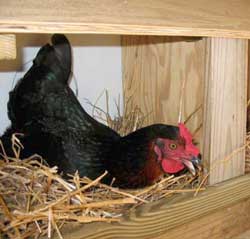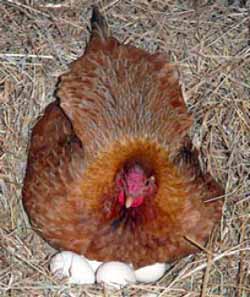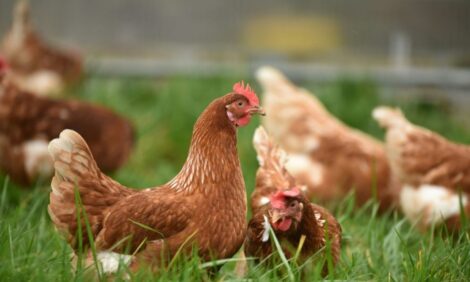



Keeping Garden Chickens in North Carolina - 3
Egg production is covered in this third part of a useful guide to keeping chickens for the hobby farmer from North Carolina State University Cooperative Extension.
Hens are expert incubators

Young hens (pullets) begin to lay at 16 to 24 weeks of age, depending on breeds and environmental conditions.
Commercial egg-laying operations regulate the number of hours of light their chickens receive each day as a way to ensure an even, steady production of the maximum number of eggs. Small backyard garden flocks are usually not placed under this light regulation regime, with the understanding that egg laying will slow or even stop during the darker months of the year. Go ahead and let your hens rest during the shorter daylight months of the year: egg production will begin again when the days lengthen in the spring.
If you wish to regulate lighting to maximise short-term egg production, you will need 14 to 16 hours of daylight each day in the fall and winter months. Naturally decreasing daylength in the fall or early winter frequently causes hens to moult – a natural process by which the hen replaces her feathers – and stop laying for about two months. This is normal and not a cause for concern.
Whatever the breed, good laying hens will have large, soft, red combs and wattles and bright, prominent eyes. Remember, however, that hens of different breeds may well have combs of different sizes and shapes. As good layers mature, the yellow pigmentation of the vent, eye ring, ear lobe, beak and shank (ankles) will fade from yellow to almost white. The yellow colour comes back when the hen stops laying for any period of time. Twelve hens will produce an average of nine or 10 eggs per day for several months, with peak production as 32 to 34 weeks of age, and then may slow down until they are averaging only six eggs a day by the 12th month after laying begins. Most eggs will be laid in the morning, and should be gathered as soon as possible and twice a day, if possible.
Dirty eggs should be cleaned with a dry cloth. Really dirty eggs may be cleaned with a warm, damp cloth or with warm egg-washing compound. Clean, dry eggs should be placed in cartons, with the small end down in the carton and the large end facing up, and refrigerated as soon as possible. Unless you are a very careful manager and find a niche market, you will not make a profit or even recoup your costs through egg sales with a small home flock. Some home flock ordinances prohibit the sale of eggs, and each state may further regulate such sales. Think carefully before you plan to use your eggs as a source of income.
Commercial operations cull (sell) hens that are no longer producing eggs at a high rate. This may or may not occur inn your home flock. If you do want to cull non-productive hens, look for those with pale, hard combs and wattles, small body size, and yellow pigmentation of the vent, earlobes, beak and shank.
Further Reading
| - | You can view the previous article in this series by clicking here. |
July 2010








